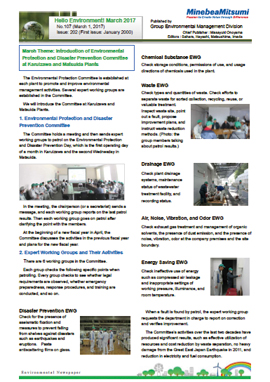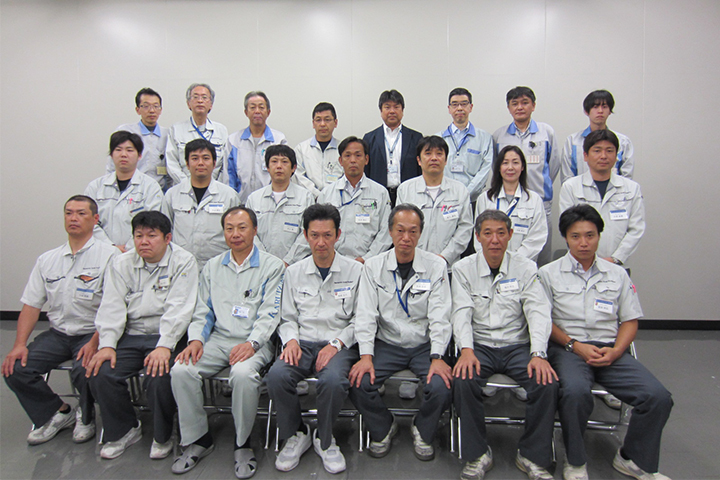Environmental Management Back Number (2017)
Back to Latest Environmental Management
Environmental Education
Basic Approach and FY2017 Initiatives (Japan)
The MinebeaMitsumi Group provides fundamental environmental management education to all new employees, midcareer hires, trainees, returnees from overseas assignments, and other employees in order to raise the environmental consciousness of each employee.
Additionally, all employees receive environmental management education covering the MinebeaMitsumi Group Environmental Policy, along with each site's environmental targets and action plans. Educational programs also cover waste separation and training drills for responding to emergencies.
FY2017 Environmental Education and Training Plan (Japan)
| Plan No. |
Training item | Recipients | Description |
|---|---|---|---|
| 1 | Environmental management basics training | New university graduates hired by Group companies |
Collective training |
| New university graduates hired by business sites | Collective training
|
||
| 2 | Environmental managementtraining | Environmental management trainers in each division | Environmental policy, environmental aspects, environmental goals, implementation plan, legal and other requirements, etc. |
| All employees | Training mainly about ISO 14001 activities undertaken in assigned divisions
|
||
| 3 | Training for mid-career hires, reassignments, overseas returnees, trainees, and temporary employees |
Mid-career hires, reassignments, overseas returnees, trainees, temporary employees |
|
| 4 | Training for employees engaged in specific types of work with obvious potential environmental impact | All employees | Appropriate training enabling employees to gain the ability to do specific types of work |
| 5 | Waste management education | All employees | Training on appropriate methods of separating waste |
| 6 | Emergency response training | All employees | Emergency response training at facilities and workplaces that have potential disasters |
| Employees requiring training | Emergency response training at facilities and workplaces that have potential disasters | ||
| 7 | Education and training deemed necessary by each site | Employees requiring training | Training and education that is not covered by other types of training |
| 8 | Internal auditor training | Employees requiring training | Internal auditor development training (trainees from each site) |
| Employees requiring training | Internal auditor training | ||
| 9 | Subcontractor and internal subcontractor training | Subcontractors
Internal subcontractors |
Environmental training for subcontractors and internal subcontractors |
| 10 | Training through external lectures and programs | Employees requiring training | Lectures, training, and legal seminars, etc., for employees to acquire certifications |
Publication of the MinebeaMitsumi Group's In-house Environmental Newsletter "Hello Environment!"

Group environmental newsletter "Hello Environment!"
The MinebeaMitsumi Group publishes the in-house environmental newsletter "Hello Environment!" which focuses on an environmental activity theme each month through easily understood, instructive articles. The newsletter is delivered to Group employees to spread environmental awareness.
The content includes not only articles on the Group's environmental activities, but practical information on the environment and daily lifestyles. The Group's first environmental newsletter was published by the Hamamatsu Plant in January 2000 as the plant's own newsletter, and through the March 2017 edition of the Group's in-house environmental newsletter, a total of 202 editions had been published.
ISO 14001 Internal Auditor Training (Japan)

ISO 14001 internal auditor trainees and instructors for FY2016
To nurture a corps of ISO 14001 internal auditors, the MinebeaMitsumi Group has conducted training 17 times between FY1999 and FY2016 and has so far certified an accumulated total of more than 330 internal auditors.
The training sessions are led by employees with external ISO 14001 auditor certification and focuses on giving trainees the knowledge and skills necessary to become internal auditors. Training candidates are nominated by each domestic plant. Training consists of lectures to gain basic knowledge, simulated audits and group discussions, followed by a written test.
Successful trainees are certified as internal auditors based on an overall evaluation of their attitude, the quality of their audit reports, and their scores on written tests.














